Suppose you take a messy impression of the patient’s mouth to make dental restorations. The models you made from these impressions don’t fit right and cause gum swelling. All these problems arise due to the use of old tools and outdated ways in dental practices.
Sometimes, even after all that effort, the result still doesn’t feel perfect to the patient. This can slow things down and make visits stressful. However, AI in dentistry changes the whole dynamic. With artificial intelligence, dentists use advanced tools and techniques that make the dental treatment accurate for patients.
This article provides a detailed overview of the application of AI in dentistry and how it helps in diagnosis, treatment, and everyday tasks.
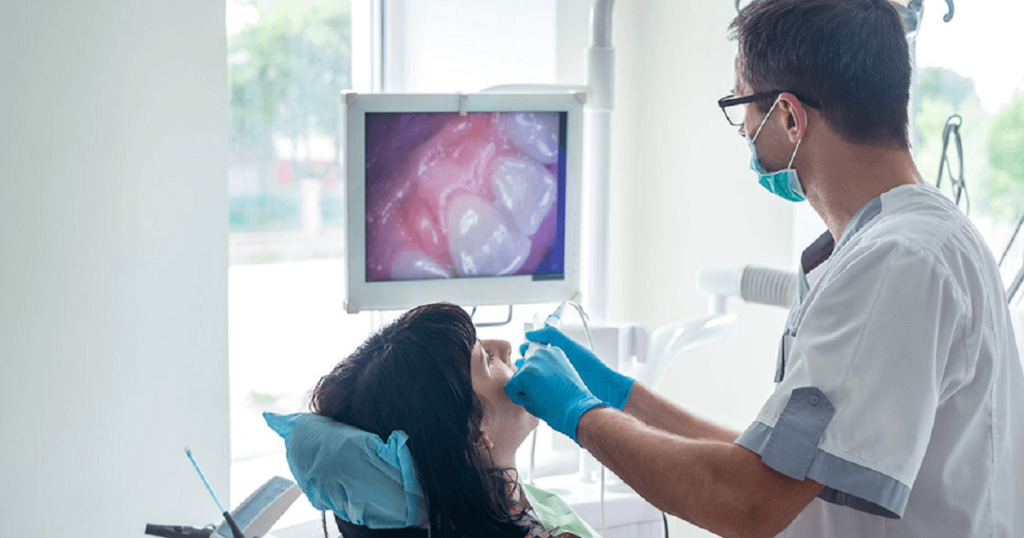
What Is AI in Dentistry and How Is It Actually Being Used Today?
It is all about using advanced computers, tools, and equipment. It helps dentists do their job faster. These tools use the data, pictures, and patterns. Artificial intelligence in dentistry looks at X-rays, 3D scanners, a printer, and health records. The main goal of using dental AI technology today is to make dental work more exact. It helps dentists make fewer mistakes and gives patients better care.
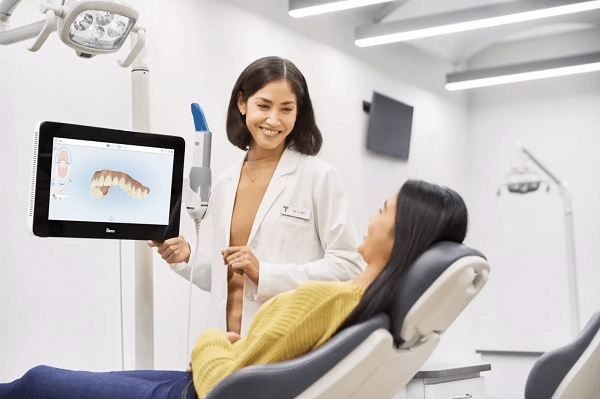
Why Is AI Gaining Popularity in Dental Care?
AI becomes a useful part of dental health care. There are a lot of reasons behind the popularity of AI in dental diagnostics. The X-rays, 3D printer, and detailed mouth inspection with the printer are common examples. Here are a few reasons behind the huge recognition of AI in dentistry.
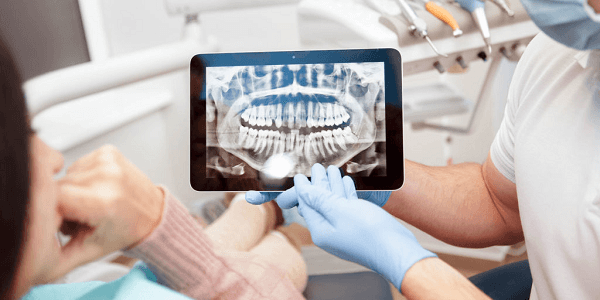
– Saves Time in the Clinic
AI helps cut down the time dentists spend on routine tasks. It can read dental scans, check health history, or spot signs of trouble faster than a person. This means the dentist spends less time guessing and more time giving care. You reduce the time for patients to wait in the detailed clinics for recording impressions.
– Improves Treatment Accuracy
Sometimes, even well-trained eyes can miss small details. AI for dental disease detection can see what’s easy to overlook, like the early start of decay, cracks, or gum problems. It helps dentists catch these issues sooner, which means treatments can start before things get worse. That leads to better results and fewer returns.
– Builds Patient Confidence
Patient trust is a matter for the dentist. When patients feel confident in your treatment, they recommend other people to your clinic. AI in dentistry reduces manual efforts and enables dentists to achieve great results. When people trust the process, they feel safer, ask more questions, and leave the chair with more peace of mind.
How Does AI Fit into the Digital Dental Lab Workflow?
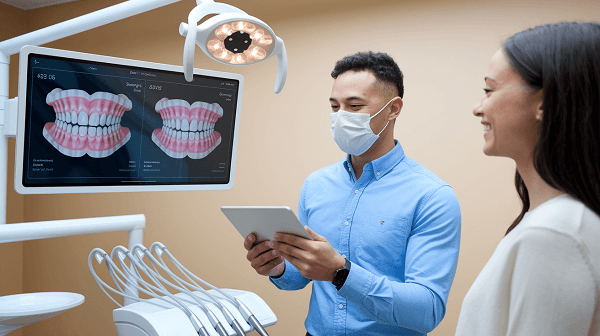
AI in dentistry helps dentists to do their daily tasks without any manual efforts. You can capture the patient’s details with great precision in just a few minutes. Let’s explore the applications of AI in dentistry.
– Diagnostic Imaging & Radiology
The artificial intelligence in dentistry enables the dentist to capture the patient’s mouth condition in image form. AI helps by reading these images for you. It checks X-rays, CT scans, and even 3D models. It finds things like tooth decay, bone loss, cysts, or infection signs.
It’s like a second pair of eyes that helps you feel more sure about what you’re seeing. It also gives you more time to explain the findings to your patient. You can zoom in, study it, and decide what comes next. You stay in charge, but now with more support and fewer chances of missing something.
– Treatment Planning & Simulation
When dentists analyze the patient’s mouth condition, they plan the treatment that suits the patient’s needs. AI helps by giving you smart suggestions. It uses patient data, tooth position, bite details, and past cases to create better treatment plans.
If you’re doing braces or aligners, AI shows how the teeth may move. You can view changes step by step. It also helps in implant planning by showing safe zones and angles. You spend less time going back and more time giving care.
– Predictive Analytics in Preventive Dentistry
AI dental tools also make a great impact in preventive dentistry. One of AI’s biggest strengths is in prevention. It looks at patterns in health records, habits, and past problems. Then it predicts what may happen next.
This means you can stop small problems from becoming big ones. If a patient is at risk for gum disease, AI can spot it early. If they often get cavities, AI can help you make a custom care plan.
– Remote Monitoring
AI in dentistry supports remote monitoring. It enables the patient to follow a treatment progress without needing an in-person visit. Patients can send updated photos or scans from home through mobile apps. You can track aligner adjustment, healing process, or changes in soft tissue. It reduces unnecessary appointments.
– Patient Communication
Dentists also use AI-based tools in dental labs that help manage communication. These tools answer common patient questions, send reminders, and guide them after care. These systems can respond instantly to inquiries about medication, appointments, or post-treatment care. This reduces the number of routine calls and frees up staff time. It also improves patient satisfaction because they receive clear instructions.
– Practice Management
AI helps smooth the practice’s dental operations by automating daily tasks like appointment booking, follow-up reminders, billing, and inventory tracking. It reduces manual errors, keeps schedules organized, and alerts staff. This keeps the clinic from reducing the time spent on paperwork. You can focus more on care, and your system handles office work easily.
Can AI Really Help in Every Dental Specialty?
Definitely yes, AI is now playing a supporting role in dentistry. In different dental fields, AI plays major roles according to the field’s technicalities.

According to the American Dental Association, AI is being used to support diagnosis, improve image reading, and guide treatment planning. It eliminates human errors and helps dentists work quickly without losing patient comfort.
A report by Harvard Medical School also shows how AI can support earlier detection of oral diseases and improve care decisions. These expert insights show that AI is not replacing dentists. However, AI helps dentists to make smarter, safer choices.
Here is an overview of how AI is transforming dental care in different specialties.
– AI in Orthodontics
AI becomes an important part of endodontics. In root canals, one missed canal can change everything. AI for dental disease detection checks radiographs and points out root shapes, angles, and hidden branches. It helps you see what’s easy to miss, especially in molars. This leads to cleaner canals and better healing.
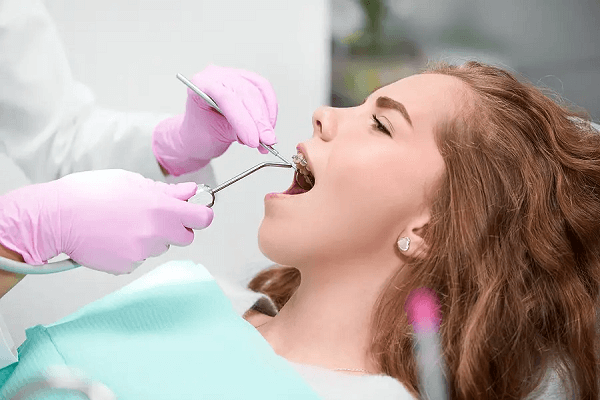
AI in orthodontic treatment planning reads cephalometric X-rays and places key landmarks in seconds. It then suggests bite corrections. This cuts down planning time and helps you feel more confident about outcomes. It also makes sharing plans with the lab or patient easy and clear.
– AI in Endodontics
AI becomes an important part of endodontics. In root canals, one missed canal can change everything. AI checks radiographs and points out root shapes, angles, and hidden branches. It helps you see what’s easy to miss, especially in molars. This leads to cleaner canals and better healing.
It looks at curve depth, tooth type, and past cases. You’ll know if a general approach is fine or if you should refer. This keeps patient care safe and smart.
– AI in Implantology
For making dental implants, dentists use 3D scanners to capture the patient’s mouth details. The Aidite 3D scanner enables the dentist to make a surface guide to make custom-sized implants. It lowers the risk of placement mistakes. In a dental scanner, AI is used to make an exact 3D model that is free from adjustment issues.
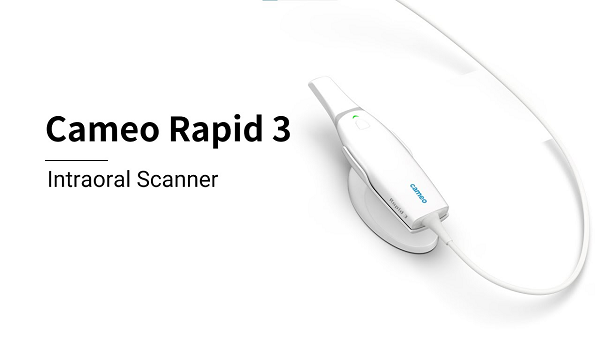
AI reads CT scans and shows bone strength levels in different areas. It gives color-coded views, so you can see the best site for support. That means fewer surprises during surgery and stronger results afterward.
– AI in Oral & Maxillofacial Surgery
When dealing with tumors or large lesions, artificial intelligence in dentistry helps by marking the borders clearly in scans. It breaks down each part layer by layer. This lets you plan how much to remove while saving healthy tissue.
With AI, you can plan jaw moves or face surgeries before making the first cut. It shows 3D views, lets you try options, and gives safe guidelines. You can send this to labs for custom splints or plates. It saves time and makes surgery more exact.
How Dentists Can Prepare for the AI Revolution?
Every second, there are new things introduced in the dental field’s use of AI. New tools and systems based on AI are now part of the daily workflow. To stay up-to-date, dentists need to grow along with the changes.
But this doesn’t mean giving up your way of working. You can prepare yourself by starting with learning how to use digital systems or tools in dentistry. You don’t have to be a tech expert. Just understand how these dental tools, like a 3D scanner and a printer, help make your job easier. You can join short training programs and attend hands-on workshops.

Then, think of this change like using an Aidite dental ergo loupe light. That light helps you see tiny cracks, tight spots, or early damage. But it only works well when you know how to use it right.
FAQs
How is AI changing dentistry?
AI is changing dentistry by helping dentists find problems early. It looks at X-rays and scans fast and gives clear results. AI also helps plan treatments better. It makes tools and fits them right. This saves time for both the dentist and the patient.
How to use AI in a dental clinic?
To use AI in a dental clinic, first get tools that work with AI. These can help with X-rays, scans, and treatment plans. Use AI to spot tooth problems early. It can also help make crowns and braces that fit well.
What is AI in teeth?
AI in teeth means using smart computer tools to help with dental care. It looks at X-rays and finds tooth problems fast. It helps plan treatments like fillings, braces, or crowns. AI also helps make dental parts that fit better.
Final Thoughts
To sum up, AI in dentistry is changing how dental care works. It helps dentists do their job better and faster. With AI, it’s easier to find tooth problems early. It also helps plan treatments and makes sure everything fits just right. This means patients get better care and feel less pain.
However, it’s important to train yourself for the adoption of new technology in dentistry and choose the brand that provides high-quality AI-based equipment. Aidite offers a cost-effective AI dental solution that integrates with the latest technology or system.
Dentists need to know how to use them the right way. The knowledge of AI tools helps you give better care to your patients. You can train yourself to make sure you feel more sure and ready. You don’t have to fear new things. When you know how to use AI, your work becomes fun and simple.



